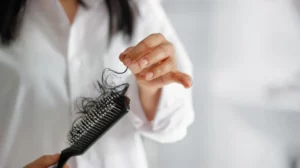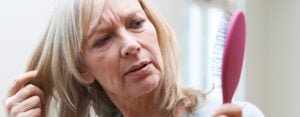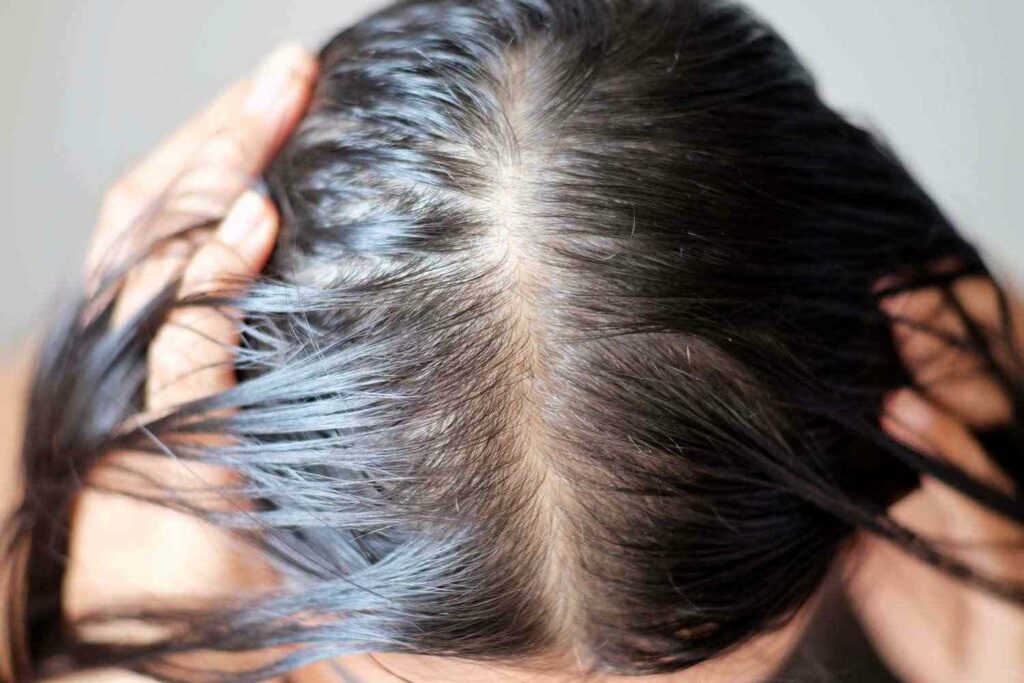As women approach the transitional phase of perimenopause, a myriad of changes unfolds within their bodies, and one often unexpected and distressing concern is hair loss. While it’s a natural part of the aging process, perimenopause hair loss can be a challenging experience. The good news is that there are natural remedies and lifestyle adjustments that can help manage and mitigate this issue. In this blog, we’ll explore the causes of perimenopause-related hair loss and delve into effective perimenopause hair loss natural treatments that empower women to embrace this stage of life with confidence.
Contents
Why Perimenopause Causes Hair Loss?
 Perimenopause brings about a range of hormonal fluctuations within a woman’s body. These hormonal changes can significantly impact various physiological processes, including hair growth. Several key factors contribute to why perimenopause often causes hair loss:
Perimenopause brings about a range of hormonal fluctuations within a woman’s body. These hormonal changes can significantly impact various physiological processes, including hair growth. Several key factors contribute to why perimenopause often causes hair loss:
- Estrogen Decline
Estrogen is a hormone that plays a crucial role in maintaining hair health. It promotes hair growth and prolongs the hair growth phase (anagen). During perimenopause, estrogen levels start to decline, and this hormonal shift can contribute to hair thinning and loss.
- Androgen Dominance
While estrogen levels decrease, androgens, particularly dihydrotestosterone (DHT), may become relatively more dominant. Androgens can harm hair follicles, leading to miniaturization and eventual hair loss. This is more commonly associated with male-pattern baldness but can also affect women during perimenopause.
- Progesterone Fluctuations
Progesterone, another female sex hormone, tends to fluctuate during perimenopause. Insufficient levels of progesterone relative to estrogen can contribute to hair loss, as these hormones work in balance to maintain optimal hair health.
- Sensitivity of Hair Follicles
The hair follicles may become more sensitive to hormonal changes during perimenopause. This sensitivity can result in a shortened hair growth cycle and lead to premature shedding.
- Thyroid Imbalances
Perimenopause can coincide with changes in thyroid function, and thyroid imbalances are known to contribute to hair loss. Both hypothyroidism and hyperthyroidism can impact the hair growth cycle.
- Reduced Collagen Production
Collagen is essential for maintaining the structural integrity of the hair. As women age and go through perimenopause, there is a natural decline in collagen production, which can affect the strength and elasticity of hair strands.
- Stress and Lifestyle Factors
The perimenopausal phase often coincides with increased stress levels, and chronic stress can contribute to hair loss. Additionally, lifestyle factors such as poor nutrition, lack of exercise, and inadequate self-care can exacerbate hair thinning.
Understanding the interplay of these factors helps explain why perimenopause can cause hair loss. It’s important for women experiencing these changes to adopt a holistic approach to hair care, addressing both hormonal imbalances and overall well-being for optimal results.
What Are Some Perimenopause Hair Loss Natural Treatments?
Addressing perimenopause-related hair loss naturally involves adopting a holistic approach that encompasses lifestyle changes, dietary modifications, and the use of natural remedies. Here are some perimenopause hair loss natural treatments that may help:
Balanced Diet
 Adopting a balanced and nutrient-rich diet is a fundamental step in addressing perimenopause-related hair loss. Essential vitamins and minerals play a crucial role in promoting healthy hair growth. Vitamin A supports sebum production, vitamin C aids in collagen synthesis, vitamin E provides antioxidant protection, and the B-complex vitamins contribute to overall hair health. Additionally, incorporating iron-rich foods is important, as iron deficiency is associated with hair thinning. Omega-3 fatty acids found in fish, flaxseeds, and walnuts can also enhance the health of hair follicles.
Adopting a balanced and nutrient-rich diet is a fundamental step in addressing perimenopause-related hair loss. Essential vitamins and minerals play a crucial role in promoting healthy hair growth. Vitamin A supports sebum production, vitamin C aids in collagen synthesis, vitamin E provides antioxidant protection, and the B-complex vitamins contribute to overall hair health. Additionally, incorporating iron-rich foods is important, as iron deficiency is associated with hair thinning. Omega-3 fatty acids found in fish, flaxseeds, and walnuts can also enhance the health of hair follicles.
Herbal Supplements
Herbal supplements can be considered to support hormonal balance and combat hair loss during perimenopause. Saw palmetto, for example, is believed to inhibit the production of DHT, a hormone associated with hair loss. Horsetail extract is rich in silica, promoting hair strength and thickness. Ginseng and black cohosh are herbs with potential benefits for hormonal regulation. However, it’s crucial to consult with a healthcare professional before adding any supplements to your routine to ensure safety and appropriateness for your health.
Essential Oils
Essential oils can be employed for their stimulating properties on the scalp and their potential to encourage hair growth. Rosemary oil, known for improving circulation, can be diluted with a carrier oil and massaged into the scalp. Lavender oil has calming effects and may help reduce stress, contributing to overall hair health. Cedarwood and peppermint oils are thought to promote blood flow to the hair follicles. When using essential oils, always dilute them properly and perform a patch test to avoid irritation.
Herbal Hair Rinses
 Herbal infusions can be used as natural hair rinses to nourish the scalp and hair. Nettle, rich in vitamins and minerals, is known for its potential to promote hair growth. Chamomile has soothing properties, while hibiscus is believed to strengthen hair. Prepare these herbal infusions as tea, allow them to cool, and use them as a final rinse after shampooing. This can leave your hair feeling revitalized and contribute to a healthier scalp environment.
Herbal infusions can be used as natural hair rinses to nourish the scalp and hair. Nettle, rich in vitamins and minerals, is known for its potential to promote hair growth. Chamomile has soothing properties, while hibiscus is believed to strengthen hair. Prepare these herbal infusions as tea, allow them to cool, and use them as a final rinse after shampooing. This can leave your hair feeling revitalized and contribute to a healthier scalp environment.
Scalp Massage
Regular scalp massages are a simple yet effective way to improve blood circulation to the hair follicles. Massaging the scalp with your fingertips in circular motions helps distribute natural oils and nutrients, promoting hair growth. If you incorporate essential oils into the massage, choose oils like rosemary or lavender for added benefits. This relaxing practice not only supports hair health but also provides a moment of self-care, reducing stress and contributing to overall well-being. Make scalp massage a part of your routine, and over time, you may notice improvements in the thickness and vitality of your hair.
Adaptogen Herbs
Adaptogen herbs, such as ashwagandha and rhodiola, can be valuable allies in managing perimenopause-related hair loss. These herbs are known for their ability to help the body adapt to stress and support hormonal balance. Ashwagandha, in particular, has been studied for its stress-reducing properties and potential positive effects on hair health. Rhodiola is believed to enhance the body’s resistance to stressors. Including adaptogens in your daily routine, whether through herbal teas or supplements, may contribute to a more balanced hormonal environment. This, in turn, can positively impact the health of your hair.
Lifestyle Changes
Managing stress is essential for overall well-being and plays a significant role in addressing hair loss during perimenopause. Engage in stress-reducing practices such as yoga, meditation, or deep breathing exercises to promote relaxation and hormonal balance. Regular exercise is also beneficial, as it not only helps alleviate stress but also improves blood circulation, contributing to a healthy scalp. Creating a balanced and mindful lifestyle that prioritizes self-care can have a positive impact on both your mental well-being and the health of your hair.
Gentle Hair Care
Adopting a gentle approach to hair care is crucial for individuals experiencing perimenopause-related hair loss. Avoid harsh chemical treatments, excessive heat styling, and tight hairstyles that can contribute to hair damage and breakage. Choose sulfate-free, mild shampoos and conditioners that cater to your specific hair type. Allow your hair to air-dry whenever possible and use minimal heat during styling. By treating your hair with care, you minimize the risk of further damage and create an environment conducive to healthy hair growth.
Stay Hydrated
Hydration is a simple yet often overlooked aspect of maintaining overall health, including that of your hair. Drinking an adequate amount of water helps keep your body and hair well-hydrated. Dehydration can negatively impact hair health, leading to dryness and brittleness. Make it a habit to consume enough water throughout the day, and consider incorporating hydrating foods such as water-rich fruits and vegetables into your diet. Proper hydration contributes to the elasticity and vitality of your hair strands.
It’s important to note that results may vary. Thus, what works for one person may not work for another. Additionally, patience is key, as natural treatments often take time to show noticeable effects. Always consult with a healthcare provider before making significant changes to your diet, and lifestyle, or adding supplements to your routine, especially if you have pre-existing health conditions.
Does Perimenopause Hair Loss Grow Back?
 Perimenopause-related hair loss can be a distressing experience for many women. But the good news is that, in some cases, hair may regrow or thicken with time. The effectiveness of regrowth depends on various factors, including the underlying causes of hair loss, individual health, and the adoption of appropriate interventions. For instance, if the primary cause is hormonal changes, and the hormones stabilize through the progression of perimenopause or with the implementation of hormonal balance strategies, there is a higher likelihood of hair regrowth.
Perimenopause-related hair loss can be a distressing experience for many women. But the good news is that, in some cases, hair may regrow or thicken with time. The effectiveness of regrowth depends on various factors, including the underlying causes of hair loss, individual health, and the adoption of appropriate interventions. For instance, if the primary cause is hormonal changes, and the hormones stabilize through the progression of perimenopause or with the implementation of hormonal balance strategies, there is a higher likelihood of hair regrowth.
However, it’s essential to note that regrowth may not be immediate, and patience is key. It often takes several months to observe visible improvements, and the extent of regrowth varies among individuals. In cases where perimenopause hair loss is associated with genetic factors, the potential for complete regrowth may be more limited. Consulting with a dermatologist or healthcare provider can help determine the specific causes of hair loss and develop a personalized plan for managing and, when possible, promoting regrowth.
Overall, while not everyone may experience complete regrowth, adopting a holistic approach to address the factors contributing to hair loss can enhance the chances of restoring hair health during and after the perimenopausal phase.
Conclusion
In conclusion, perimenopause hair loss natural treatments involve a holistic approach that encompasses lifestyle changes, dietary adjustments, and herbal remedies. While hormonal fluctuations during perimenopause can contribute to hair thinning, adopting a nutrient-rich diet, incorporating herbal supplements, and practicing stress reduction techniques can support overall hair health. Gentle hair care practices, regular scalp massages, and hydration are simple yet effective measures.
While regrowth may vary among individuals and depend on factors like genetics, patience is key. Consulting with healthcare professionals ensures a personalized plan and enhances the chances of restoring hair health during this natural phase of life. If you are facing menopause-related issues, menopause treatment at HerMantra can help. Book your free trial online menopause treatment session now.


